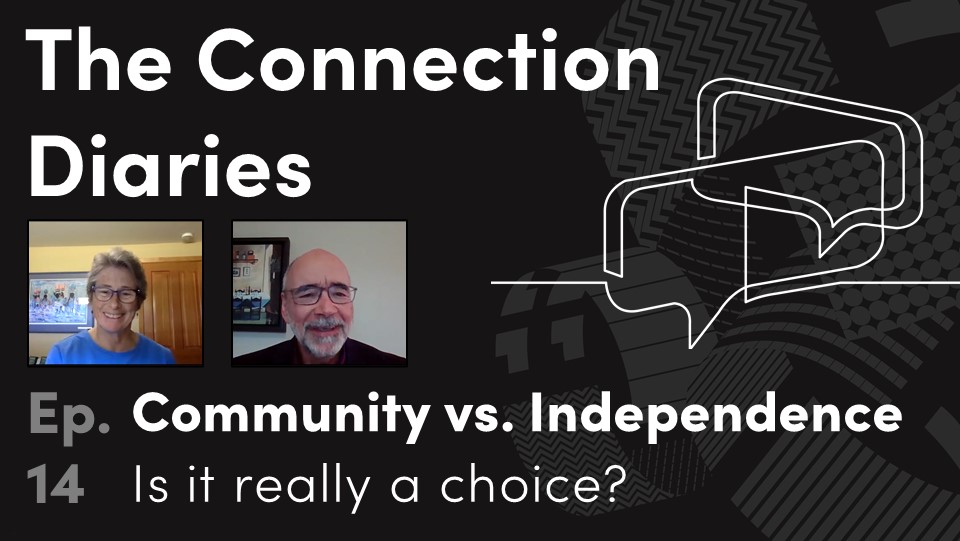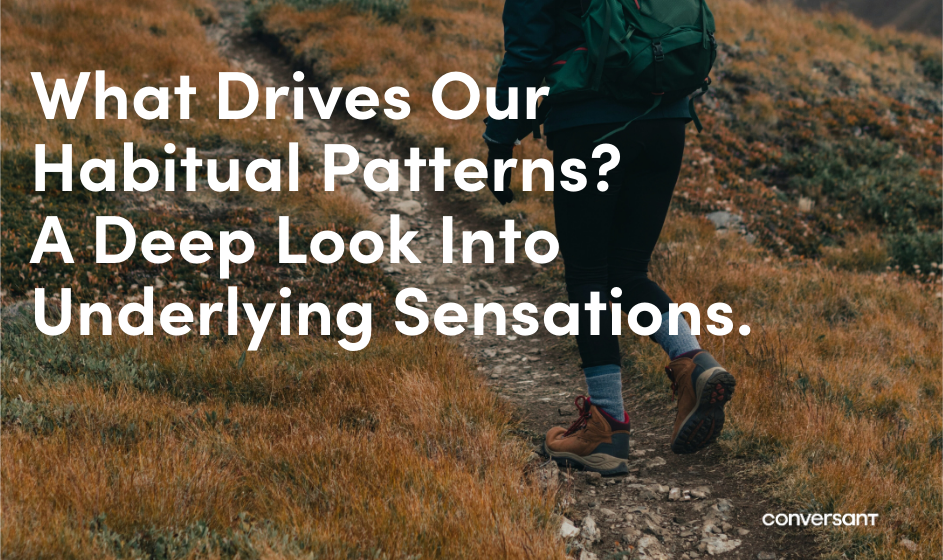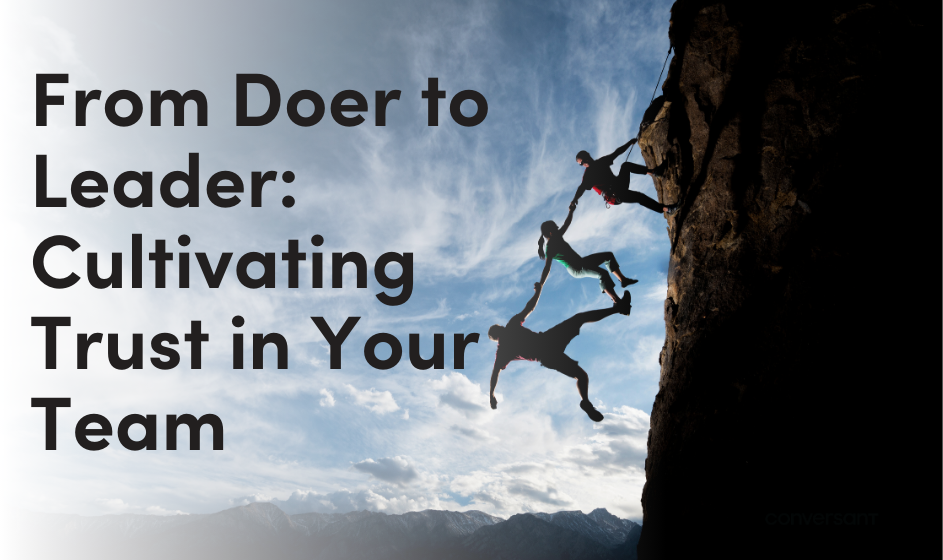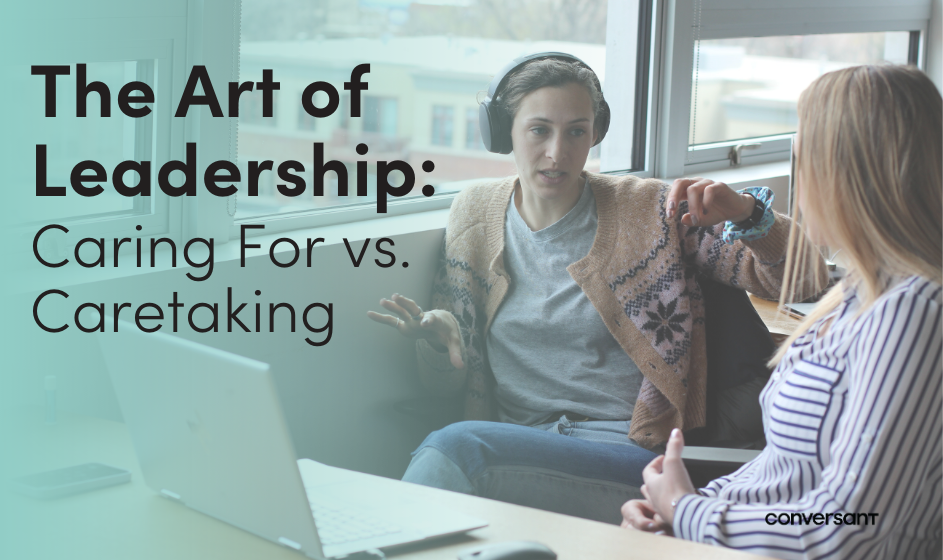
Community vs. Independence – is it really a choice? | The Connection Diaries
Is community really an important asset in organizational life?
We often talk about the value of Community, and sometimes we find that clients react with surprise and skepticism – what does that even mean? Do we really have to work on “community building” in order to be successful?
We’ve also been hearing about a perceived tension between our rights as individuals and the common good. We live in cultures that place a high value on individual merit and performance, and yet we’ve learned this year that isolation and carrying our burdens alone can be deeply damaging not only to our productivity but also to our health and well-being. Can we maintain our independence while also being a committed part of something with others? How? And what does this mean for our organizations?
In this episode of The Connection Diaries, Mickey Connolly and Anne Murray Allen share why they believe these two things aren’t actually mutually exclusive. Instead, they argue that our perceived value as an individual (and our well-being) is inextricably linked to our sense of belonging and our ability to contribute – to our relationships, our teams, to what we’re in together – in ways we find meaningful and energizing. When we prioritize the health of our communities and value each person within them, we find ourselves supported to realize our own unique brilliance and encouraged to bring those strengths to our teams.
“When we’re contributing to a community at work, the whole community is getting smarter. And when the community is smarter, I have more resource to act independently. So they coexist. We don’t do anything in isolation. The more I can contribute to you as my team member, the more I belong and the more esteem I’m held in, the more resources are now available to me.”
What questions are you wrestling with? Is there anything you’d love advice from other leaders on how to handle? What have your organizations been doing that’s working well? Comment below or connect with us on LinkedIn! Let’s unleash our collective brilliance.
Full Transcript
Mickey: Hello everybody, thanks for spending a few minutes with us. This is Mickey Connolly, and I’m here with my partner in Conversant, Anne Murray Allen, and the thing that we are looking at today is, does the whole idea of community really live as an asset to organizational life? Does it, really? Why is because we’ve heard enough things going on in organizations where there seems to be this tension between my individual rights and the common good. And so, I start out by saying, Anne, to you, do you think this issue of reconciling this tension between individual rights and common good—does that matter to organizational success? To organizations that thrive and contribute and achieve their goals?
Anne: Yeah, well I think it matters a lot, and it is kind of a societal norm that would—it’s set up as a choice. Either I have total freedom or independence to operate, and you assume my intentions are good. I’ve been given individual goals to achieve; I can do that however I see fit. Or do I have to keep a team happy, bring a team along, all of that. So, it’s that dichotomy—how much do I have my own independence, versus, I have to worry about bringing everyone with me. And it’s—you know, really, if you think about it, it’s a false choice. You know, our ability to act freely really comes through, you know, the mission of the team we’re a part of. There’s something we’re out to achieve together.
Mickey: Well, I think—you really look all over the world, that societies when they want to punish somebody, they’re shunning somebody, or ostracizing someone, or they’re in solitary confinement. So if we really want to punish you, we take you away from human connection. What seems to me to suggest that whatever my needs are as an individual include my need to be connected.
Anne: That’s right. And by being part of a community—and it’s the word community sometimes, too, I hear clients go, “Do we really have to spend time on community building?” Well that’s our best word for saying, making everyone connected and coherent as an organization or a team. Because you’re really emphasizing and bringing to light the relationships that make everyone smarter as individuals. You know, when we’re contributing to a community at work, the whole community is getting smarter. And when the community’s smarter, I have more resource to act independently. So they coexist. We don’t do anything in isolation. The more I can contribute to you as my team member, the more I belong, and the more esteem I’m held in, the more resources are now available to me. So that, I think, is the healthiest way to look at it. Team is very limiting. Community is really about bonds and ties and taking care that everyone’s successful, right? And that nobody’s hung out to dry. And I just—I think it’s a very powerful term, and I stand in it very specifically, you know?
Mickey: That’s really good. Well, if you look at The Vitality Imperative, which is our book that you wrote the forward to, you know, there we’re talking about what we think is an inextricable relationship between three experiences: the experience of community, and contribution, and choice. And the way you just talked about it, my choices actually expand the degree to which I’m experienced as a contributor, and my desire to contribute goes up the degree to which I am received, I’m valued, I feel like I belong here, I have a place. It feels so necessary to realize those three things absolutely require one another. The community, this sense of connection and belonging and validity gets fed by contributing and being contributed to. And that’s only something I can choose. I can’t be forced.
Anne: That’s right, you have to want to enlist, and then you have to see the benefit. It’s an emotional, actually very palpable feeling of, “Wow, we’re really cooking with oil here.” And I’m bolder in my own actions. I mean, I can’t tell you how many positions I’ve had where, “Anne, would you go work on this mission critical project for a company?” And at any point in time, if I felt like I was hanging out on a limb, if I had the presence of mind to go, “Help! Is anyone here? I need to talk something through. It’s amazing how people come, you know, resources are marshaled. People come to your aid, because why? People enjoy the benefits of community. They know that it’s fun to contribute to somebody else’s success. And likewise, I’m bolder in my action knowing I am not out on that limb alone. I actually can feel people have my back.
Mickey: Yeah, that desire to contribute, sometimes the courage that it takes to make the big difference that’s needed, we get that courage from the sense of belonging and reciprocity. You know, for any of you who are leaders and managers inside of organizations, it’s really healthy to develop some ongoing sense—you could call it assessment—but a sense of, are people experiencing all three things? Are they experiencing a sense of belonging, so that this is my people. You know, I’m here, I’m safe, I’m valued. And we would say if that’s true, then community is being experienced. Is there a sense of contribution? That people feel like, “Hey I’m making a difference that I’m proud to make.” And are people being related to with the kind of respect where they choose to make that difference rather than they’re dominated, folded, spindled,—
Anne: Right.
Mickey:—manipulated into making that difference.
Anne: Yeah, that they’re not micromanaged, that people feel like, “I’ve got volition. I’ve got choice here.” But I can tell you, you can recognize when you don’t have it all integrated, when you see somebody who feels like they are on their own. It’s like, “Well everyone’s expecting me to deliver this objective by the end of the month and I’m going to suffer trying to figure that out.” When you notice that, you know it’s a failure in terms of bridging that dichotomy between I’m independent and an individual, versus I belong to something. And that should never cause pain. It should never cause the feeling of “I’m on my own.” It’s a time to remind each other, you know, “Hey, you’re part of a bigger group. Your contribution will matter to us. We’re here, you’re not alone.”
Mickey: And I think anytime that there’s this apparent fight between individuality and common good, that would be a great time to stop and check it out. Wait a minute. How healthy are we in all three of these domains?
Anne: That’s right.
Mickey: So, and when it comes to community, is there a sense of we’re looking out for one another, available to one another, a sense of belonging and contribution? Do people know they’re making a difference? Because sometimes our measures don’t even let people experience contributing.
Anne: Exactly.
Mickey: And finally, do we recognize that people are always choosing to be wholehearted or not? So choice is there all the time, and we can’t force people to be that way. So the fact that this has come up recently where we’ve seen people struggling with this tension between the individuality and community, we think—or the common good—it means there’s a breakdown one of those three things.
Anne: That’s right.
Mickey: And we think it’s worth all of our attention to keep caring for this sense of community, the sense of contribution, and the dignity of choice.
Anne: And that will build healthy high-performance organizations and families, so…
Mickey: Mighty fine! I think we ought to have that; healthy, high performing, enjoyable organizations and families.
Anne: Yes.
Mickey: Well everybody, thanks for tuning in with us. Anne and I care a lot about this reconciliation of individuality and community, and we hope that just having a chance to pause and think about it was worth your time.
Anne: Thank you.
Mickey: Okay, bye-bye everybody.



